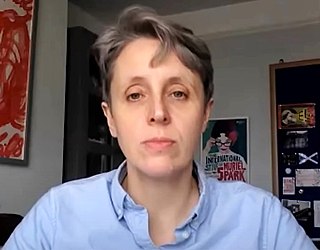Feminism is a range of socio-political movements and ideologies that aim to define and establish the political, economic, personal, and social equality of the sexes. Feminism holds the position that societies prioritize the male point of view and that women are treated unjustly in these societies. Efforts to change this include fighting against gender stereotypes and improving educational, professional, and interpersonal opportunities and outcomes for women.

Transphobia consists of negative attitudes, feelings, or actions towards transgender people or transness in general. Transphobia can include fear, aversion, hatred, violence or anger towards people who do not conform to social gender roles. Transphobia is a type of prejudice and discrimination, similar to racism, sexism, or ableism, and it is closely associated with homophobia. Transgender people of color can experience many different forms of discrimination simultaneously.
Liberal feminism, also called mainstream feminism, is a main branch of feminism defined by its focus on achieving gender equality through political and legal reform within the framework of liberal democracy and informed by a human rights perspective. It is often considered culturally progressive and economically center-right to center-left. As the oldest of the "Big Three" schools of feminist thought, liberal feminism has its roots in 19th century first-wave feminism seeking recognition of women as equal citizens, focusing particularly on women's suffrage and access to education, the effort associated with 19th century liberalism and progressivism. Liberal feminism "works within the structure of mainstream society to integrate women into that structure." Liberal feminism places great emphasis on the public world, especially laws, political institutions, education and working life, and considers the denial of equal legal and political rights as the main obstacle to equality. As such liberal feminists have worked to bring women into the political mainstream. Liberal feminism is inclusive and socially progressive, while broadly supporting existing institutions of power in liberal democratic societies, and is associated with centrism and reformism. Liberal feminism tends to be adopted by white middle-class women who do not disagree with the current social structure; Zhang and Rios found that liberal feminism with its focus on equality is viewed as the dominant and "default" form of feminism. Liberal feminism actively supports men's involvement in feminism and both women and men have always been active participants in the movement; progressive men had an important role alongside women in the struggle for equal political rights since the movement was launched in the 19th century.

Transfeminism, or trans feminism, is a branch of feminism focused on transgender women and informed by transgender studies. Transfeminism focuses on the effects of transmisogyny and patriarchy on trans women. It is related to the broader field of queer theory. The term was popularized by Emi Koyama in The Transfeminist Manifesto.
Lad culture was a media-driven, principally British and Irish subculture of the 1990s and the early 2000s. The term lad culture continues to be used today to refer to collective, boorish or misogynistic behaviour by young heterosexual men, particularly university students.
Sheila Jeffreys is a former professor of political science at the University of Melbourne, born in England. A lesbian feminist scholar, she analyses the history and politics of human sexuality.

Julia Michelle Serano is an American writer, musician, spoken-word performer, transgender and bisexual activist, and biologist. She is known for her transfeminist books, such as Whipping Girl (2007), Excluded (2013), and Outspoken (2016). She is also a public speaker who has given many talks at universities and conferences. Her writing is frequently featured in queer, feminist, and popular culture magazines.

Julie Bindel is an English radical feminist writer. She is also co-founder of the law reform group Justice for Women, which has aimed to help women who have been prosecuted for assaulting or killing violent male partners.

Transmisogyny, otherwise known as trans-misogyny and transphobic misogyny, is the intersection of transphobia and misogyny as experienced by trans women and transfeminine people. The term was coined by Julia Serano in her 2007 book Whipping Girl to describe a particular form of oppression experienced by trans women. In an interview with The New York Times, Serano explores the roots of transmisogyny as a critique of feminine gender expressions which are "ridiculed in comparison to masculine interests and gender expression."
Feminist views on transgender topics vary widely.

TERF is an acronym for trans-exclusionary radical feminist. First recorded in 2008, the term TERF was originally used to distinguish transgender-inclusive feminists from a group of radical feminists and social conservatives who reject the position that trans women are women, including trans women in women's spaces, and transgender rights legislation. Trans-inclusive feminists assert that these ideas and positions are transphobic and discriminatory towards transgender people. The use of the term TERF has since broadened to include reference to people with trans-exclusionary views who are not necessarily involved with radical feminism.

Kathleen Mary Linn Stock is a British philosopher and writer. She was a professor of philosophy at the University of Sussex until 2021. She has published academic work on aesthetics, fiction, imagination, sexual objectification, and sexual orientation.

Carceral feminism is a critical term for types of feminism that advocate for enhancing and increasing prison sentences that deal with feminist and gender issues. The term criticises the belief that harsher and longer prison sentences will help work towards solving these issues. The phrase "carceral feminism" was coined by Elizabeth Bernstein, a feminist sociologist, in her 2007 article, "The Sexual Politics of the 'New Abolitionism'". Examining the contemporary anti-trafficking movement in the United States, Bernstein introduced the term to describe a type of feminist activism which casts all forms of sexual labor as sex trafficking. She sees this as a retrograde step, suggesting it erodes the rights of women in the sex industry, and takes the focus off other important feminist issues, and expands the neoliberal agenda.

Trans: When Ideology Meets Reality is a 2021 nonfiction book by journalist Helen Joyce that criticizes the transgender rights movement and transgender activism. It is published by Oneworld Publications, their fifth book in the Sunday Times bestseller list. Reviews of the book ranged from positive to critical. In 2023 it was shortlisted for the John Maddox Prize.
Discrimination against transgender men and transmasculine individuals, sometimes referred to as transandrophobia, anti-transmasculinity, or transmisandry, is a similar concept to transmisogyny and discrimination against non-binary people. Transmisogyny, discrimination against transgender men and discrimination against nonbinary people are types of transphobia which affect trans women, trans men and nonbinary people respectively.
The Women's Declaration International (WDI), formerly the Women's Human Rights Campaign (WHRC), is an international advocacy organisation founded in the United Kingdom. WDI has published a Declaration on Women's Sex-Based Rights, and has developed model legislation to restrict transgender rights that has been used in state legislatures in the United States. The organisation has been described as gender-critical, anti-trans, anti-LGBTQ+, anti-gender, trans-exclusionary, trans-exclusionary radical feminist (TERF), and as a hate group, and in several countries the group has been linked to the far right. It has been noted by Southern Poverty Law Center as being part of an "anti-LGBTQ+ pseudoscience network".
Gender-critical feminism, also known as trans-exclusionary radical feminism or TERFism, is an ideology or movement that opposes what it refers to as "gender ideology": the concept of gender identity and transgender rights, especially gender self-identification. Gender-critical feminists believe that sex is biological and immutable, while believing gender, including both gender identity and gender roles, to be inherently oppressive. They reject the concept of transgender identities. These views have been described as transphobic by feminist and scholarly critics, and are opposed by many feminist and LGBT rights organizations.
Finn Mackay is a British sociologist and radical trans feminist campaigner.

FiLiA is a British gender-critical feminist charity founded in 2015 that describes itself as part of the women's liberation movement. FiLiA organizes a conference, held first in 2008 as Feminism in London, in different cities, which it now describes as the "largest annual grassroots feminist conference in Europe". FiLiA is gender-critical, and states that it supports "sex-based rights." It has lobbied against gender recognition reform and considers gender self-identification a threat to "women's protected rights." Critics describe it as anti-transgender and transphobic. FiLiA is critical of the sex industry and considers pornography harmful. It has campaigned on behalf of women internationally, including in Iran, Cyprus, and Kenya. It has been described as one of "the most important 'gender critical' groups" alongside Women's Declaration International.
Material Girls: Why Reality Matters for Feminism is a 2021 book by Kathleen Stock which explores issues related to transgender civil rights and feminism. The book reached number 13 on the UK list of best selling non-fiction charts.









